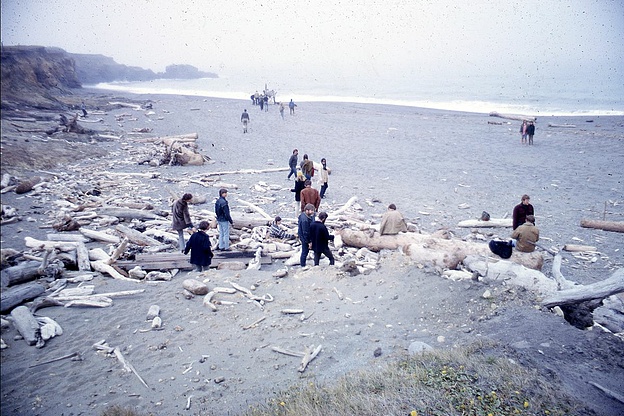Collective Practices II: Symbiotic Organizations

In the frame of Collective Agenda, Grégory Castéra curator and co-director of Council, is the programme director of the post-master course Collective Practices at KKH, Stockholm. The second year of the programme will consider Symbiotic Organizations. Here is the open call.
Collective practices exist within all societies and share a rich heritage throughout the fields of arts, politics and sciences. Nowadays, they are qualified by terms like participation, group, collectivity, ensemble, collaboration, mutualisation, community, cooperation, sharing, assembly, commons and network. Often reduced to strictly human activities, they are performed with or by non-human entities–such as pets, viruses, smartphones or artificial intelligence.
Collective Practices is an intensive one-year research course (one-year, full-time). In the course, the term collective is considered primarily as a practice: exercises, habits, protocols and attitudes realized on a regular basis. The course trains the students to “put on the glasses” of the collective and to compose together their knowledge to better understand the complexity of societal issues. To do so, students learn, teach each other and experiment with collective practices that reflect on ownership, governance, environment, technique, discrimination, attention, and knowledge, and contribute to build a more diverse and sustainable society.
The course is led by Grégory Castéra, curator and director of Council (Paris), and co-editor of The Against Nature Journal. Collective Practices is a Post-master by the Royal Institute of Art developed in collaboration with Council.
SYMBIOTIC ORGANISATIONS
Collective Practices II: Symbiotic Organizations will inquire about the application of symbiotic practices and models to cultural organizations. Often opposed to a narrow interpretation of Darwinism that considers evolution of species as a fight of everyone against each other, symbiosis (from Greek σύν, « together », and βίωσις, « living ») is a close and sustainable interaction between organisms in order to survive. Since the end of the 19th Century, the development of societies has followed this scientific controversy. Whereas competition and individualism became dominant values of art and culture over the 20th Century, symbiosis inspires more caring, diverse, cooperative and sustainable practices and models in various fields.
Through collective learning and experimental field work, the students will develop proposals on symbiotic cultural organizations. These proposals will be presented in June 2022 through an exhibition, an event, a publication, or any hybrid format.
COURSE STRUCTURE
The course is organized around principles of mutual learning, regular practice, holding space for each other and site-specific trans-disciplinary experimentation. It is divided into 10 mandatory blocks of 5-10 days. Between the blocks, weekly sessions happen online (3-5 hours per week), and the students independently develop their work. They can share a desk in the course’s office and they can use the school facilities.
The course articulates 3 organs. Commissions: experimental field work around one cultural organization over one year Studio Practice: a regular training with practices from culture field that use the collective as a medium Seminars: mutual learning about key concepts, genealogies and case studies The 3 organs include collective readings, exercises and training, lectures and workshops, group and individual supervision, site visits and study trips, and public events.
In order to fully benefit from the collective research atmosphere we strongly urge participants to reside in Stockholm, however if for some reason this is not possible, we ask non-resident students to attend a minimum of seven blocks and submit substitute assignments. The course will also offer field trips in Sweden and abroad. Course participants are expected to pay for part of the costs. The field trips are not mandatory and for those who are unable to take part a substitute assignment will be given.
COLLECTIVE PRACTICE RESEARCH CYCLE
The first year (2020-2021), focused on the elaboration and experimentation of a platform for mutual learning about collective practices at the intersection of art and political ecology. The 5 commissions inquired about a museum of ecological reparation (Imani Jacqueline Brown), a learning platform inspired by the the mangrove schools in Guinea Bissau (Filipa Cesar with Sónia Vaz Borges & Sana na N’Hada), a confederacy of villages in Europe (Inland), the model of the culture house (Mint), a decolonized and indigenous art residency (Massimiliano Mollona & Elizabeth Povinelli) and a space for resters (Julia Morandeira & werker collective). Guest teachers included May Adadol Ingawanij, Nasim Aghili, Emanuel Almborg, La Buse, Alice Chauchat, Wu Chuan Lun, Valentina Desideri, Annie Goh, Goldin+Senneby, Johanna Hedva, Elof Hellström, Every Ocean Hugues, Catalina Insignares, April Lin, Carolina Mendonça, Museum of Capitalism, The School of Poetic Computation, Rojava Film Commune, Trojan Horse (Tommi Vasko and Kaisa Karvinen), Benoît Verjat and David Zilber.
SELECTION
Applicants should hold a Master Degree in art, curating or relevant field, or have equivalent and documented knowledge and experience. The selection is based on a CV, a short personal letter of intent and a presentation of one of the applicants realized work which relates to the theme of the course. In the letter, the candidate should motivate in which ways the conceptual frame of the course is relevant to their profile. A short on-line interview will be part of the final selection.
Candidates should be interested in ecological dimensions of collective practices. They should be open to experimental forms of collective production which challenge individual authorship, and to an open-ended process oriented towards material and immaterial outcomes. The course requires that participants can efficiently manage independent study and production time between course blocks. Collectives should apply as individuals.
TUITION
EU/EEA citizens, Swedish residence permit holders and exchange students do not pay tuition. Scholarships are available for participants from outside the European Union.
For more information contact: Anneli Hovberger.
The course runs from September 2021 – June 2022
Applications close on April 15th
Collective Practices II: Symbiotic Organizations is a project by KKH, the Royal Institute of Arts, Stockholm, in collaboration with Council
PROGRAMME DIRECTOR
Grégory Castéra
Cover and top image: Experiments in Environment Workshop: Driftwood City Score, July 4, 1966. Lawrence Halprin Collection, The Architectural Archives, University of Pennsylvania.